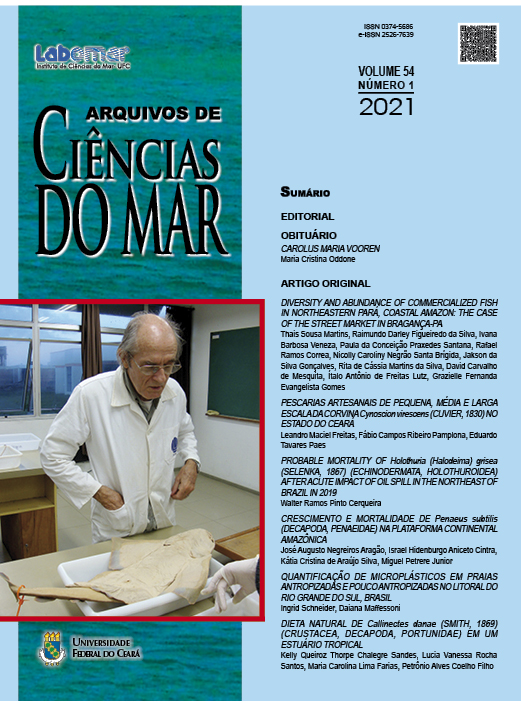PROBABLE MORTALITY OF Holothuria (Halodeima) grisea (SELENKA, 1867) (ECHINODERMATA, HOLOTHUROIDEA) AFTER ACUTE IMPACT OF OIL SPILL IN THE NORTHEAST OF BRAZIL IN 2019
Provável mortalidade de Holothuria (Halodeima) grisea (Selenka,1867) (Echinodermata, Holothuroidea) após impacto agudo do derramamento de petróleo no Nordeste brasileiro em 2019
DOI:
https://doi.org/10.32360/acmar.v54i1.43608Resumo
A costa nordestina brasileira sofreu no ano de 2019 o maior impacto agudo de petróleo da história do país, com todos os estados da região sendo afetados por óleo extrapesado. Holothuria (Halodeima) grisea é um holoturoide detritívoro que ingere sedimento, podendo engolir de forma passiva petróleo oriundo de derramamentos existente no sedimento. Para investigar a ocorrência de petróleo no conteúdo intestinal de H. (H.) grisea foi coletado um N de 20 indivíduos no litoral de Salvador (BA) no mês de outubro de 2019 entre as coordenadas 12°57’ S e 38°20’ W. Desse total, 10 indivíduos foram encontrados mortos no ambiente e 10 coletados vivos, para fins de comparação. Dos indivíduos encontrados mortos, 40% estavam eviscerados (sem intestino), não sendo possível fazer as análises de conteúdo. Dos 6 indivíduos mortos restantes, 67% apresentaram petróleo no conteúdo intestinal. Para as 10 holotúrias coletadas vivas, nenhuma estava eviscerada e todas estavam com o intestino cheio, sendo observado petróleo no conteúdo intestinal de um espécime (10%). O teste do χ2 confirmou com α de 0,025 a possível relação do petróleo com a mortalidade de
H. (H.) grisea, demonstrando que o derramamento agudo de óleo provavelmente foi letal para essa espécie na costa nordeste do Brasil.
Palavras-chave: pepino-do-mar, hidrocarbonetos, HPAs
Downloads
Downloads
Publicado
Como Citar
Edição
Seção
Licença
1. Proposta de Política para Periódicos de Acesso Livre
Autores que publicam nesta revista concordam com os seguintes termos:
- Autores mantém os direitos autorais e concedem à revista o direito de primeira publicação, com o trabalho simultaneamente licenciado sob a Licença Creative Commons Attribution que permite o compartilhamento do trabalho com reconhecimento da autoria e publicação inicial nesta revista.
- Autores têm autorização para assumir contratos adicionais separadamente, para distribuição não-exclusiva da versão do trabalho publicada nesta revista (ex.: publicar em repositório institucional ou como capítulo de livro), com reconhecimento de autoria e publicação inicial nesta revista.
- Autores têm permissão e são estimulados a publicar e distribuir seu trabalho online (ex.: em repositórios institucionais ou na sua página pessoal) a qualquer ponto antes ou durante o processo editorial, já que isso pode gerar alterações produtivas, bem como aumentar o impacto e a citação do trabalho publicado (Veja O Efeito do Acesso Livre).

